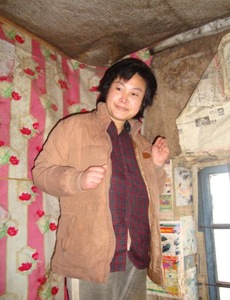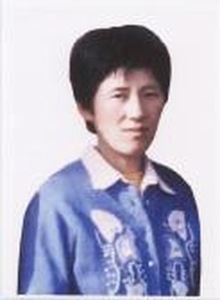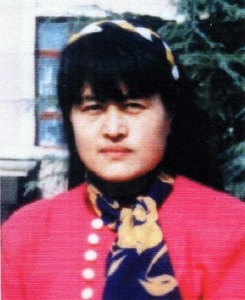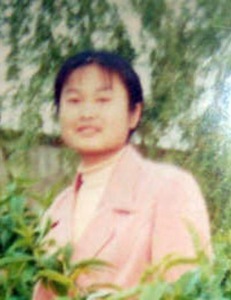Psychiatric Abuse of Falun Gong Practitioners in Shandong Province
(Minghui.org) In July of 1999, China's communist regime launched a nationwide campaign against Falun Gong, a mind-body practice based on the principles of Truthfulness, Compassion, and Forbearance. Since then, many Falun Gong practitioners have been arrested and subjected to different forms of torture and abuse.
One such form involves labeling healthy practitioners as mentally ill, the “treatment” of which involves forcing unknown drugs and chemicals into their bodies. This often results in long-lasting physical and mental damage. Falun Gong practitioners have reported multiple after effects, such as memory loss, being muddleheaded, physical numbness and pain throughout the body, and other symptoms.
More severe cases have resulted in psychosis and mental instability, often resulting in death.
Liu Zhimei is one such victim.
Injection of Unknown Drugs Causes Mental Collapse, Death
On the morning of Feb. 13, 2015, a grisly discovery was made in a village in Laiyang City, Shandong Province. During a morning walk, some villagers found the body a woman in her mid-30s, floating in a well. She was later identified as Liu Zhimei.
A bright student with big dreams, Ms. Liu's aspirations were cut short when she was expelled from Tsinghua University (known as China's MIT) at the age of 21, because she refused to give up her belief in Falun Gong. The Chinese Communist Party (CCP) had recently initiated a brutal campaign of persecution against the practice. Liu Zhimei was arrested and spent six years in prison, where she was repeatedly drugged.
Just before her release in 2008, Zhimei was injected with a large dose of unknown drugs. Later, her family suspected this to be the cause of long-lasting psychotic episodes she suffered.
She would ramble nonsensically, and wave her arms in the air as if she were running. When asked her age, she either remained silent, or answered “21.” For Liu Zhimei, time seemed to have stopped at age 21.
At night she would wet her bed and sleep on the urine-soaked mattress.
 Liu Zhimei, after suffering a mental collapse from the persecution she experienced in prison, would clench her fists and run into a corner of her room, whenever someone approached. Photo taken in 2010.
Liu Zhimei, after suffering a mental collapse from the persecution she experienced in prison, would clench her fists and run into a corner of her room, whenever someone approached. Photo taken in 2010.
Liu Zhimei died within seven years of her release from prison. The young woman was one of many Falun Gong practitioners from Shandong Province subjected to psychiatric abuse while imprisoned for their faith.
More Deaths Due to Psychiatric Abuse
Three other Falun Gong practitioners from Shandong Province have died as a result of psychiatric abuse.
Su Gang
Su Gang was from the city of Zibo and worked as a software engineer for the Sinopec Qilu Petrochemical Company. On May 23, 2000, the 32-year-old was picked up and sent to the Weifang Mental Hospital.
Mr. Su was injected daily with unknown drugs and chemicals, causing severe nerve damage. When his family learned of his detainment and abuse, his uncle Su Lianxi went on a hunger strike in protest. Hospital officials released the young man to his father.
Nine days of drug injections had taken their toll, however. Su Gang looked lifeless and numb, his eyes dull. He was extremely weak, his face was pale, and his body had stiffened.
By the morning of June 10, Mr. Su was dead.
 Ms. Xu Guiqin died 9 days after her release.
Ms. Xu Guiqin died 9 days after her release.
Xu Guiqin
When 38-year-old Xu Guiqin was released from prison for practicing Falun Gong, a doctor told her family to watch her closely, and not let her move around freely. Her life was in grave danger.
Just before her release, she had been injected with four vials of nerve-damaging drugs. As a result, her face swelled up, and she experienced stiffness in her tongue. As she couldn't eat, she became anorexic. Her body was numb, and she suffered severe memory loss.
At home, Xu Guiqin's physical and mental state worsened with each passing day. She died after nine days, on Dec. 10, 2002.
 Ms. Zhang Dezhen died at the age of 38 after psychiatric abuse.
Ms. Zhang Dezhen died at the age of 38 after psychiatric abuse.
Zhang Dezhen
Zhang Dezhen, 38, was being held at the Mengyin Detention Center. During her detainment at the facility, she was injected with unknown drugs by staff member Wang Chunxiao and a doctor from the Mengyin Hospital. Her condition became critical, and her life was threatened.
When doctors injected her again with unknown drugs on Jan. 31, 2003, Ms. Zhang died.
The names of officials who gave the order for the drug injections are known and recorded. The individuals involved in her death were Lei Yancheng from the Mengyin 610 Office, detention center chief Sun Kehai, and hospital director Guo Xingbao.
Practitioners Detained in the Jinning City Mental Hospital
Lu Dongmei
Ms. Lu Dongmei was an employee at the Luxing Real Estate Development Company. On Sept. 11, 1999, police took the 30-year-old to the Jining Mental Hospital. Pressured by police, hospital officials started forcibly administering unknown drugs to Ms. Lu – first a dose of half a pill, then later a whole pill.
Chief physician Han Peng instructed five staff members to hold her down on the floor, and injected her with more drugs. She was injected again two weeks later.
After the injections, Lu's condition rapidly deteriorated. While lying in her hospital bed, her legs would spasm and move on their own, stretching and curving backward. She had difficulty sleeping and was confused about her condition. Her mind could not focus, and she described it as going blank as time slowed down; each minute felt like an entire day. She suffered aches and pains in her heart.
Her body began to malfunction and change, with her arms and head tilted to one side. She also started sleepwalking.
Qiao Xingxia
Qiao Xingxia, 40, was taken to the Jining Mental Hospital on Dec. 27, 1999. At Division 5 of the hospital, no examination was given to determine if Ms. Qiao had a mental disorder, or whether drugs should be administered. She was just accused of being mentally ill for practicing her faith.
On the third day of her detainment, officials tied her to a bed and forced drugs down her throat. This continued throughout her detainment. The head nurse, surname Wang, and other staff at the hospital forced her to take them by beating her until she complied.
The drugs caused dryness in her mouth, and her tongue would not work. She was unable to walk or stand without help. Her entire body was wracked with pain, and her arms and legs moved involuntarily. She suffered from headaches, was lethargic and very weak, and experienced memory loss.
She was detained for 22 days, and forced to pay 2,000 yuan for her “treatment.” Police demanded that her family sign release documents that covered up what really happened at the hospital.
Wang Ling
Ms. Wang Ling lives in Mengyin Town in Linyi City, Shandong Province. In the summer of 2002, while in her 30s, her parents and husband took her to a brainwashing center run by the Mengyin County 610 Office, for practicing Falun Gong. She was detained at the facility for one month.
After her release, Ms. Wang faced further persecution. To force her to give up her belief in Falun Gong, her family took her to the Jining Mental Hospital. There she was forced to take Clozapine, a heavy anti-psychotic drug typically used to treat schizophrenia, and was injected with unknown drugs.
Upon her release from the mental hospital, Wang experienced a complete mental breakdown.
Liu Dayuan
According to a Minghui report from June of 2005, Liu Dayuan was sent to the Jining Mental Hospital in 2000. While held at the facility, doctors and nurses injected her with drugs, damaging her mind and nervous system.
When her life was in jeopardy, Ms. Liu was released.
22-year-old Practitioner, Name Unknown
According to an article published on the Minghui website in January 2000, a young practitioner submitted the following account:
“I went to Beijing on Oct. 25, 1999, to appeal to the government to stop its persecution of Falun Gong. Three days later, I was taken back to Shandong Province by local police. A week later, officials took me to the Jining Mental Hospital.
“Upon arriving at the hospital, four male doctors forced me to wear a patient's uniform. While changing clothes, a female nurse suddenly started to inject me in my backside. I immediately stood up and protested, but four doctors grabbed me and tied me to a bed, then forcibly injected me with a large dose of drugs.”
The account continues. “The drugs began to take effect. I tried to control myself, but I could not stand on my own. My mouth and tongue were also very dry.
“Later, a doctor injected me with another drug, and this knocked me out completely. When I awoke, my mind was blank, and I felt dizzy, with a bad headache. My neck was stiff. I was in pain, but my limbs were numb and weak, and I had trouble remembering things.
“My tongue was stiff. I couldn't control it, and it hung out of my mouth. I was unable to eat, so the nurse force-fed me through my nose, causing it to bleed.
“I received nine drug injections in total.
“Three days after arriving at the hospital, I was forced to take the potent antipsychotic drug Perphenazine. In the beginning, the dose was one pill each time. Because I kept doing the Falun Gong exercises, the dosage was increased to four or five pills. The side effects of this drug were similar to those of the forced drug injections.
“This mental and psychological abuse lasted for 36 days.”
Cases in Other Regions of Shandong Province
Besides Jining, there are multiple reports of psychiatric abuse occurring in Shandong Province. Practitioners ages 22 to 50 were abused, with most falling between the ages of 37 to 44.
Mental hospitals in Tai'an, Linyi, Weifang, and Jiaozhou carried out the abuse, including facilities in the Wangcun Labor Camp, and Shandong Women's Prison.
Yu Fenglai
An armed police officer forced Yu Fenglai to take an unknown oral drug while being held in the Wangcun Labor Camp.
“Officials at the Wangcun Labor Camp in Shandong Province forced me to take a pill, “ Mr. Yu said. “They then deprived me of sleep and tried to brainwash me with hate-propaganda. The drug began to take effect, causing pain throughout my body due to extreme fatigue.
“In the end, I fell into a vegetative state, totally losing control of my bodily functions.”
Xiao Jingsen
Mr. Xiao Jingsen was from Weifang City. Prior to October of 2000, he walked to Beijing twice to appeal for his right to practice Falun Gong. He was arrested and taken to the Changle Labor Camp by local police.
For more than two months, he was forced to orally take unknown drugs, every day. At times, he was also injected with unknown drugs.
The abuse took its toll on Mr. Xiao's physical and mental state. He went from being a healthy person with clear eyes to being completely out of it, with no emotion on his face and a blank expression.
Jiang Guobo
Jiang Guobo was being held in the Changle Labor Camp for his belief in Falun Gong. A doctor (surname also Jiang) began intravenous infusions on him in December of 2000.
He experienced the following symptoms two days later: swollen eyes, kidney pain, a chaotic mind, insomnia, and fatigue.
Mr. Jiang strongly protested this treatment. Fortunately, officials stopped the infusions and released him on medical parole a few days later.
Tan Guihua
On Sept. 12, 1999, authorities picked up 42-year-old Tan Guihua and sent her to the Jiaozhou Mental Hospital.
Upon her arrival, hospital staff attempted to inject her with drugs, but she protested. A nurse gathered eight mental patients to push her to the ground and hold her there as she was given the injections. Within seconds Ms. Tan felt extremely weak and uncomfortable.
Her heartbeat increased so rapidly that she had to hold herself up to support her body. A wave of intense pain struck her body, and she bit down on her blanket to avoid making noises. She then lost consciousness.
When she regained consciousness, she still suffered from the symptoms as the effects of the drugs gradually wore off.
A doctor approached Ms. Tan and asked her if she would continue to practice Falun Gong. When she replied yes, the doctor shocked her with an electric baton. He repeated this procedure seven times.
She was force-fed more drugs and given injections three times a day.
As Tan Guihua held to her faith, the abusive “treatment” changed. A doctor had a nurse (surname Ma) inject her with a different drug. The drug's effect was quite powerful, lasting over a month. It inhibited her eye movement, and her reactions slowed down severely. Her menstrual period stopped.
Several days later, another drug was added to the mix, causing Ms. Tan to tremble so badly that she could not even hold her food bowl. This lasted for 20 days.
After three months, Tan Guihua was released from the hospital. When her family came to pick her up, she was blind, and her mind blank. Her entire body was swollen, and she looked dull. Her reactions were slow, and it took her a long time to even speak one word.
The effects of the abuse were long term, including memory loss.
Zhou Caixia
Fifty-year-old Zhou Caixia was held under criminal detention in Beijing on May 13, 2000, before being transferred to the Jiaozhou Mental Hospital. There she was force-fed and injected with unknown drugs. Insiders reported that hospital officials used her as a guinea pig to test imported drugs, claiming she suffered from mental illness.
Shandong Women's Prison
The drugging of Falun Gong practitioners detained at the Shandong Women's Prison was done on a daily basis. An insider working in the prison later revealed that prison officials would claim practitioners having a family history of mental disorders. This would allow them to implement long-term drug “treatment” programs on practitioners who refused to renounce their belief, without consequence.
Such Falun Gong practitioners were caught in a hopeless Catch 22: as the drugs forced on them took effect, they caused hallucinations, memory loss, agitation, muddled thoughts – all symptoms of psychosis and mental illness. Officials then used this as an excuse to use more drugs to treat it, worsening the situation.
